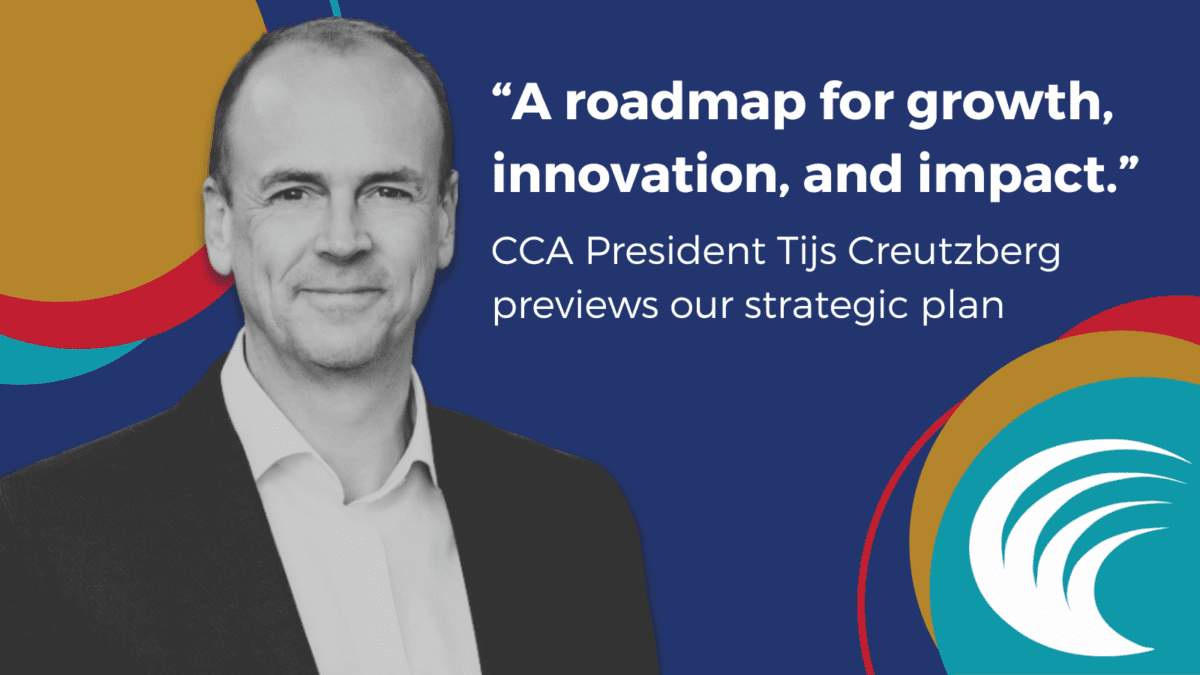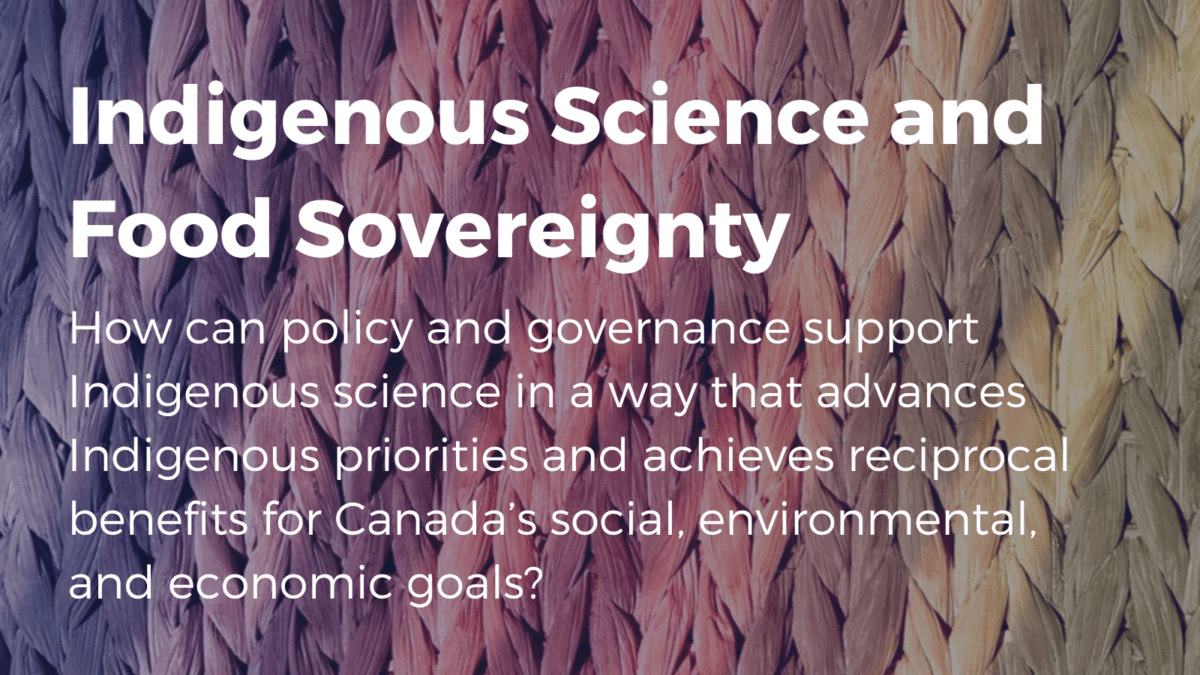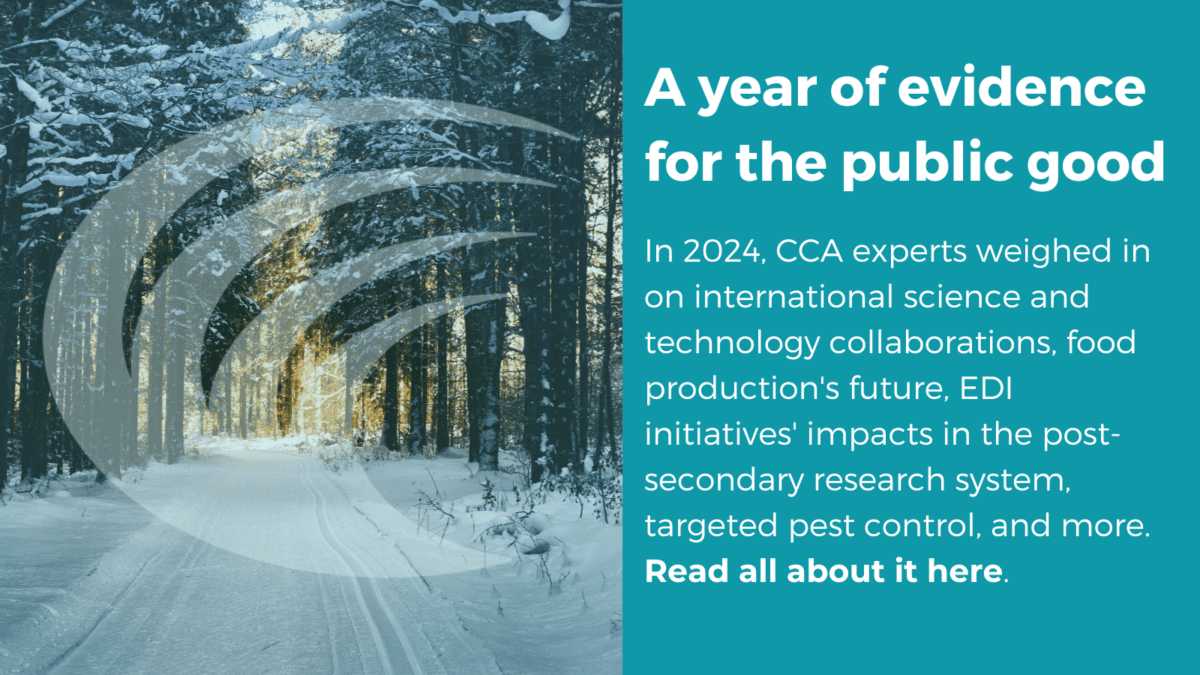
Welcome to The Advance, the newsletter of the CCA. Want to help us promote evidence-informed policy in the public interest? Feel free to forward this newsletter to a friend or colleague. If you haven’t subscribed yet, you can sign up here.
IN THIS EDITION:
- “A roadmap for growth, innovation, and impact”
- The CCA launches two new projects
- Readings on civic capital, climate misinformation, mitigating AI risks, graduate students below the poverty line, and more
- A year of evidence for the public good

As we welcome a new year, and as I reflect on my first six months as President and CEO, I’m heartened by what we’ve achieved together and very much inspired by the opportunities ahead.
These past six months have been a whirlwind of connection and collaboration. I’ve had the privilege of meeting with leaders from across Canada’s evidence-for-policy ecosystem—government officials, academic experts, and partners in the private and non-profit sectors. These conversations have underscored the vital role the CCA plays in connecting and convening people to address complex policy challenges that cut across any one discipline, sector, or jurisdiction.
One of the most significant milestones of this period has been the smooth transition under the federal government’s Strategic Science Fund, through which the CCA is committed to delivering 10 assessments over the next five years. Each expert panel-led assessment will provide policymakers with the unbiased, robust evidence they need to make informed decisions on critical issues. This funding is a testament to the trust placed in the CCA’s expertise and proven assessment process, and a validation of the importance of evidence-informed policy in shaping Canada’s future.
As we embrace this success, we also look ahead with a renewed commitment to innovation and responsiveness. For 20 years, the CCA has been known for its trusted and rigorous approach to synthesizing evidence. But as the world becomes more complex and interconnected, the need for accessible, actionable knowledge delivered more quickly has never been greater. That’s why we are reimagining our process to better serve decision-makers across all sectors and levels of government.
This reinvention is not about changing our core values—impartiality, excellence, and independence remain at the heart of everything we do. Instead, it’s about applying those values in new ways to meet the changing evidence needs of decision-makers and expanding our reach and impact. We are charting new pathways to evidence, embracing new technologies, and making our work more visible, understandable, and relevant to a broader audience. We are also making our services more accessible by identifying opportunities for the CCA and prospective sponsors and collaborators to work with philanthropic foundations.
Whether it’s a province seeking to manage its specific climate adaptation challenges or a non-profit effecting change in a complex and rapidly changing environment, our goal is to provide the insights needed to drive impact.
This vision is encapsulated in the CCA’s new five-year strategic plan. Building on our history of excellence, the plan sets ambitious goals for expanding the visibility, connections, and accessibility of our work. It’s a roadmap for growth, innovation, and impact—one that aligns with the evolving needs of policymakers and society at large. The plan emphasizes collaboration, recognizing that the best solutions often emerge from diverse perspectives and shared expertise. It also underscores the importance of communication, as we strive to make our findings more engaging and actionable for all Canadians.
Looking ahead, I’m excited about the opportunities to deepen our partnerships, explore new areas of inquiry, and continue building on the CCA’s legacy of excellence. I’m particularly grateful to the many volunteers who serve on our panels, Scientific Advisory Committee, and Board of Directors, and inspired by the dedication and expertise of the CCA team, whose passion for unbiased evidence assessment and its potential to inform policy is unmatched. Together, we are poised to make this a transformative year for the organization and the broader evidence-for-policy community.
To our stakeholders, partners, and supporters, thank you for your continued trust and collaboration. Your engagement makes our work possible, and your insights help shape the future we aspire to create. As we embark on this journey, I invite you to stay connected with the CCA by reading our reports, attending our events, or sharing your ideas and perspectives.
Here’s to a happy, prosperous, and evidence-informed 2025!
Tijs Creutzberg, President and CEO
The CCA launches two new projects
Click below to learn more about our upcoming assessments on…


Readings
- The annual Food Price Report suggests a family of four may pay up to $800 more in groceries in 2025, according to news reports. The annual price report “used artificial-intelligence modelling, combined with expert input, to forecast overall food-price increases of 3 to 5 percent next year.” Evan Fraser, a member of the CCA’s Expert Panel on Atypical Food Production Technologies for Canadian Food Security, told the Globe and Mail that those projections don’t account for additional uncertainties. “Events over the past five years have made me really worried that sometimes we’re underestimating the scale of the problem that we’re facing,” said Fraser. “The only thing that will be surprising is stability.”
- Global Affairs Canada recently announced its Arctic Foreign Policy, a multi-pronged diplomatic strategy that will see new consular offices in Alaska and Greenland and the appointment of an Arctic Ambassador. “For many years, Canada has aimed to manage the Arctic and northern regions cooperatively with other states as a zone of low tension that is free from military competition,” said Melanie Joly, Minister of Foreign Affairs, at a recent launch event for Canada’s Arctic Foreign Policy. “However, the guardrails that we have depended on to prevent and resolve conflict have weakened.”
- The 92nd annual Acfas Congress will take place from May 5 to 9 at the École de technologie supérieure in Montréal. Find Acfas’s preliminary program and calls for paper proposals here.
- “Canadians aren’t worried enough about superbugs,” Emily Baron Cadloff writes for Maclean’s. But that doesn’t apply to all Canadians. Cadloff interviews Jon Stokes, a biochemistry professor at McMaster University, who explains how artificial intelligence might hasten the development of targeted molecules to combat antibiotic-resistant bacteria. “With machine learning, we can run through millions—or billions—of chemical structures that have the potential to kill those bacteria, in a fraction of the time it would take in the laboratory,” Stokes says.
- “There is no conclusive evidence of a strong positive or negative relationship between AI adoption and short-term productivity improvement,” the Dais, a public-policy think tank based at Toronto Metropolitan University, writes in a new report. Waiting for Takeoff draws on Statistics Canada data gathered before the launch of ChatGPT. Researchers with the Dais emphasize that “AI is a long game, not a quick fix,” and that “companies must integrate it thoughtfully into their operations to see real gains.”
- In Alberta, fewer than half of all rural households have access to broadband internet that meets the federal government’s targeted speeds, with Saskatchewan and Manitoba not far behind. In Policy Options, Michael McNally and Gregory Taylor detail ongoing challenges to rural broadband connectivity in the province—some of which feature in the CCA’s 2021 report, Waiting to Connect.
